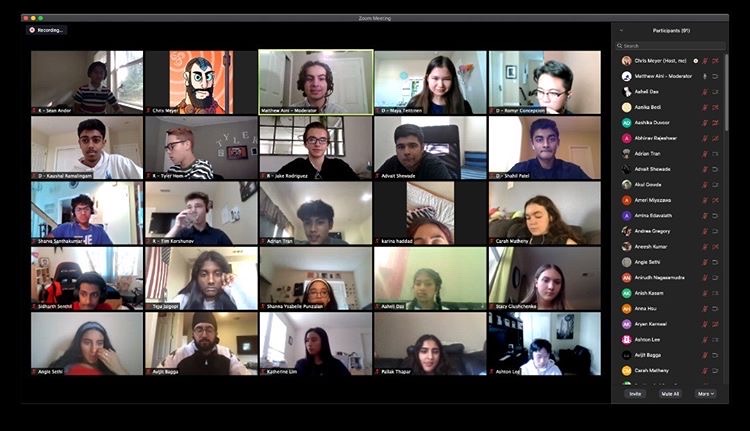Dublin High Democrats and Republicans host debate on criminal justice reform
With ongoing Black Lives Matter protests and the November election coming up, the Dublin High Democrats, Republicans, and JSA (Junior States of America) held their first debate of the year on the widely discussed topic of criminal justice reform. On September 16, students gathered on Zoom to watch the debate moderated by Matthew Aini of JSA and debated by Romyr Concepcion, Maya Teittinen, Shahil Patel, and Kaushal Ramalingan of the Dublin High Democrats and Jake Rodriguez, Tyler Hom, Sean Andor, and Tim Korshunov of the Dublin High Republicans. From discussing systemic racism and its role in poverty to questioning the funding of the current police task force, the debaters delivered an engaging discourse on the different liberal and conservative arguments.
Systemic Racism
The debate started off with a long discussed topic of systemic racism: systems and structures that disadvantage certain racial groups. The Democrats began with the statement that racism affects all aspects of society, citing longer sentences for African-Americans, redlining, and the over-policing of minority neighborhoods.While the Republicans recognized that racism exists within society, they accredited over-policing to the poverty and higher crime rates in minority areas rather than systemic racism. Moreover, they recognized that bias exists within every one of us and promoted universal sentences, where everyone is held to the same standards, to minimize bias in court. Overall, the Democrats closed with the statement that systemic racism needs to be recognized even if poverty is a large factor as the continuous cycle of oppression forces minority groups into a constant impoverished state; the Republicans, conversely, closed with the idea that not every unequal outcome of policy is because of racism.
Prison Labor Systems and Mass Incarceration
In the second topic, the debaters discussed the topic of the ethics of prison labor systems, for-profit prisons, and mass incarceration. First, the two sides discussed their thoughts on mass incarceration, where large populations of minorities are incarcerated. While the Republicans expanded on their argument for universal sentences for low level crimes, the Democrats advocated for policies that would prevent crime, including social welfare programs, affordable housing, and accessible healthcare. Next, the two sides discussed the ethics of for-profit prisons or private prisons and came to the agreement that they are immoral and should be illegal. Lastly, the ethics of prison labor was debated as the Republicans brought up the 13th Amendment, stating that inmates are forced to do labor as a result of their crimes. Romyr Concepcion of the Democratic side fired back, arguing that “People deserve to see their labor bear fruit!” All in all, the Democrats saw prison labor as a violation of human rights. They advocated for fair compensation, restoration of voting rights, and transparency in employment despite prior conviction for low level crimes. On the other hand, the Republicans stated that the laws do protect inmates’ rights and that prison labor gives inmates work experience to advance in society.
“Defund the Police” and Police Reform
Lastly, the recent popular call to “defund the police” and the hot topic of police reform was brought into the debate. “Defund the police” has been a frequent mantra of Black Lives Matter protestors throughout the summer, coined by the public as a response to George Floyd’s death. The Democrats expressed support of police reform like the reallocation of funds to preventive measures rather than reactive measures to crime. They gave examples of supporting social workers rather than providing police with military equipment. However, Tim Korshunov of the Republicans argued that the amount of policing is justified in pursuit of what he termed “law and order.” To conclude the debate, the Democrats cited stagnant crime rates despite increases in police funding, signifying that the real issue is over-policing rather than under-policing. The Republicans argued that the increase in violence justifies more police training, thereby defending the increased funding.
Overall, the debate was successful and had great attendance, composed of both students who were purely curious and those who wanted extra credit. Not only were the audience members able to interact with the debaters, but teachers chimed in on their opinions as well. “All of us were very civil,” Maya remarked. “I’m thrilled about how this turned out!”
It’s heartening to see students at Dublin High attending these events, as Maya explained. “It’s incredibly important to get engaged in politics, as younger people tend to have lower voter turnout rates.” In the future, whether online or in person, the three clubs are considering holding debates on climate change and social welfare.
To learn more about about JSA, DHS Democrats, and DHS Republicans, check out their Instagram pages: @dhs_jsa, @dhs.democrats, @dublinrepublicans
Your donation will support the student journalists of Dublin High School. Your contribution will allow us to purchase equipment and cover our annual website hosting costs.

Anna Hsu is a junior at Dublin High and the Student Life Editor this year. She enjoys connecting with people and sharing ideas and stories. Over...



































